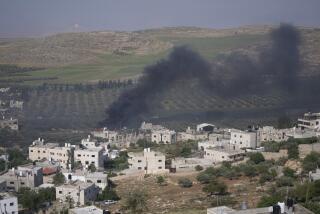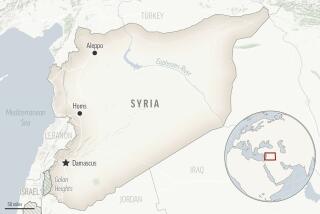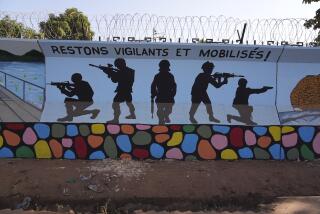Islamic State said to kill scores in Syrian border city
Islamic State jihadists engaged in a bloody rampage in the Kurdish-majority Syrian city of Kobani and its environs on Friday, officials said, executing at least 142 civilians before withdrawing as vicious fighting continued in the town for a second day.
Idriss Naasan, vice minister for foreign affairs in Kobani’s Kurdish administration, said Islamic State’s aim was to terrorize the population of the community near the Turkish border, which was the scene of heavy fighting last year.
“They tried to kill the largest number of civilians, so they roamed around neighborhoods and targeted them,” said Naasan, explaining that many women and children had been taken hostage by the militant group, complicating efforts to rout the extremists from the town.
He said the YPG, a Syrian Kurdish militia that has emerged as a powerful force against Islamic State, “has them surrounded from four points, but fighting continues because they are using civilians as human shields.”
Rami Abdul Rahman, director of the pro-opposition monitor the Syrian Observatory for Human Rights, described the attack as “a crime against humanity ... it’s a barbaric massacre” in an interview with Sky News Arabia on Friday.
“The executions were perpetrated against entire families, [they were] completely exterminated,” he said, adding that the death total would make this the second largest massacre perpetrated by the group. At least 28 Islamic State militants were killed in the clashes.
Kurdish activists uploaded scores of pictures showing victims of the rampage through Kobani as well as grim images of freshly dug trenches interspersed with lines of brick.
On Thursday, Islamic State fighters disguised as YPG fighters infiltrated Kobani after detonating a car bomb near the Mursitpinar crossing with Turkey. The group also struck the village of Brakh Botan, leaving tens of villagers dead as it made its way towards Kobani, 20 miles to the north.
It was the first attack on Kobani in six months, after YPG forces, backed by U.S. planes, thwarted a four-month campaign by Islamic State to take the town. Yet, despite thousands of tons of ordnance pounding Islamic State targets, the group has maintained its presence in the northeastern region of Syria.
Meanwhile, Syrian army units continued to battle Islamic State militants in the northeastern city of Hasakeh, where fighting has displaced an estimated 60,000 civilians, according to the United Nations. The U.N. on Thursday also warned that the violence could spur an exodus of 200,000 refugees towards the border city of Qamishli, 45 miles northeast.
Hasakeh province governor Mohammad Za’al Al-Ali reassured civilians that the city was secure and the army and national defense units would remain in place.
“This is a call to the citizens of Hasakeh to return to their homes and be steadfast in them,” said Ali in an interview with Syrian State news broadcaster SANA on Friday, denying reports of withdrawals by police and army units from state institutions from the city.
“We must not believe the rumors and lies spread by opportunists.”
Many Kurds blame Islamic State’s rampage against Kurdish areas in Syria on neighboring Turkey, whom they accuse of granting open access to the militant group across its more than 500-mile border with Syria. They also point to recent successes by Kurdish and Syrian opposition forces against Islamic State, such as in the border town of Tel Abyad, 36 miles east of Kobani.
“The aim is to obstruct the joint forces that are liberating these areas of terrorists,” explained Naasan, blaming “regional agendas that are afraid of the Kurds enjoying their right to self-determination.”
Turkey, on the other hand, sees the YPG as little more than a branch of the Kurdistan Workers’ Party, with which it has been locked for more than 30 years in warfare.
Bulos is a special correspondent.
More to Read
Start your day right
Sign up for Essential California for news, features and recommendations from the L.A. Times and beyond in your inbox six days a week.
You may occasionally receive promotional content from the Los Angeles Times.







